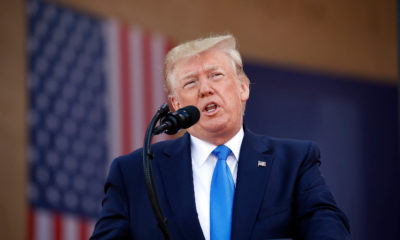World
Trump, Clinton score big victories, Rubio drops out

 Washington:Republican Donald Trump had another great night with three major victories and a near tie, while a big loss in his home state of Florida prompted Marco Rubio to drop his White House bid.
Washington:Republican Donald Trump had another great night with three major victories and a near tie, while a big loss in his home state of Florida prompted Marco Rubio to drop his White House bid.
Democratic frontrunner Hillary Clinton too scored major wins in Florida and North Carolina and in a crucial victory, she stopped self-styled Democratic Socialist rival Bernie Sanders in his tracks in the industrial Midwest by taking Ohio.
Trump won Republican primary victories in Florida, North Carolina and Illinois and was in a virtual tie with closest rival Ted Cruz in Missouri getting at least 159 more delegates and taking his total to 619 from 18 wins.
However, his loss in Ohio to its Governor, John Kasich made it more difficult for the brash billionaire to reach the 1,237 delegates he needs to capture the Republican nomination without a heated contest. Cruz has 394 delegates, Rubio 167 and Kasich 136.
But Trump’s victory in the biggest contest of the night, taking all off Florida’s 99 delegates forced Rubio out of the race and upended Republican establishment’s plans to get united against the real estate tycoon.
“This was a great evening,” he said in his primary night address describing himself proudly as a candidate of the angry and disaffected.
“There is great anger,” Trump said. “Believe me, there is great anger.”
“We have to bring our party together,” he said urging party unity amid growing speculation about the potential of a convention fight. “We have to bring it together.”
Conceding defeat, Rubio warned that Trump’s politics of division will leave America a “fractured nation”.
“America is in the middle of a real political storm, a real tsunami and we should have seen this coming,” he said. “While we are on the right side,” he said, “this year, we will not be on the winning side.”
Trump on the other hand congratulated the Florida senator “for having run a tough campaign”.
“He is tough,” Trump said. “He is smart and he has got a great future.”
On the Democratic side, Clinton won the Florida and Ohio primaries and with a win in North Carolina completed her sweep of Southern states where she has enjoyed strong support from African-American voters.
“We are moving closer to securing the Democratic Party nomination and winning this election in November,” Clinton said in a victory speech in West Palm Beach, Florida.
She said that by the end of the night she would have two million more votes than Sanders, and hold a lead of more than 300 in the delegate count.
Even in defeat, Sanders delivered his standard campaign speech, decrying the influence of big money in politics and vowed that “billionaires would have to pay their fair share”.
Describing “Rubio’s demise” as “the last gasp of the Republican reboot”, the Washington Post said “Years of carefully laid plans to repackage the Republican Party’s traditional ideas for a fast-changing country came crashing down” with him quitting the race.
The New York Times said Rubio’s exit had “spoiled the Republican buffet”. Kasich, it suggested, “is the best of the remaining three candidates, but has little to no chance of pulling past either of the other two in the delegate count.
“Those two, Donald Trump and Ted Cruz, are merely different flavours of rancid fare,” said the influential daily which has endorsed Kasich and Clinton for their parties’ nominations.
World
Lockdowns in China Force Urban Communities to Defy Censorship and Vent Frustration Online

Shanghai’s rich middle class is leading a wave of online dissent over the strict and prolonged lockdowns imposed in various parts of the country. Chinese internet censorship is struggling as patience is wearing thin in many urban centers, coming up with creative forms of online protests.
Social Media Posts Revealing Lockdown Tension in Shanghai
Drawn-out lockdowns are nothing new in China as authorities insist with the nation’s zero-Covid policy since the start of the pandemic. Currently over This time around, however, metropolitan areas like Shanghai are increasingly difficult to keep quiet, given that its more than 25 million residents have seen weeks of total isolation along with food shortages and many other service interruptions.
Dozens of towns and reportedly over 300 million Chinese citizens have been affected by lockdowns of different severity. As expected, urban netizens have been most outspoken over their difficulties by finding creative ways to get around state censorship and bans placed on topics, news comments and spontaneous campaigns.
Shanghai residents have been using mobile proxies and hijacking seemingly unrelated hashtags to talk about healthcare issues, delivery failures and the overall severity of their situation. The “positive energy” that the Chinese government wants to transmit during the recent prolonged series of lockdowns does not come naturally to those counting food supplies and online censors are working hard to filter words, trending topics and undesired social media sharing.
WeChat groups and message threads are under constant monitoring. Posts questioning the zero-Covid approach have been quickly deleted, including by leading Chinese health experts like Dr. Zhong Nanshan. Video footage is soon censored and protests and investigations are quickly made to disappear.
Where this has not worked, officials have exposed banners with warnings and outright threats like “watch your own mouth or face punishment”, while drones have been patrolling the city skies. Yet, if anything, this has led to further tensions and unspoken confrontation with Shanghai’s educated and affluent middle class.
Creative Online Solutions Harnessing Civic Energy
Announcements by Chinese social media that they would be publishing the IP addresses of users who “spread rumors” have not helped either. Tech industry research has shown that much of Asia’s tech-savvy population has a habit of using mobile proxies and other privacy tools, quickly finding workarounds to browse the internet freely and talk to the world about the hottest topics.
The sheer volume of forbidden posts is already a challenge for the very censorship system, experts explain. Unable to track all trending hashtags, state workers overlook topics that speak about the US, Ukraine or other popular news. Linking human rights elsewhere to their situation, Chinese online dissidents establish their informal channels and “hijack” the conversation to share personal or publicly relevant information about the Covid suppression in their town.
Sarcastic and satirical posts still dominate. Others hope to evade the censors by replacing words from famous poems or the national anthem. One thing is certain – social media, when harnessed with the right creativity, has proven its ability to mount pressure on the government in even some of the most strictly controlled tech environments like China.























